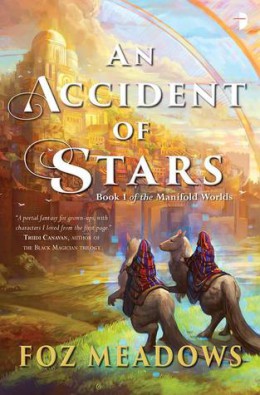This is the portal fantasy I’ve spent my whole life waiting for. I never knew it until now, but it is the truth. The glorious, shiny, magnificent truth.
I didn’t expect to like it. I don’t have a good record with portal fantasies. They haven’t been all that common in recent years, and those I’ve read were of… mixed… quality, to be polite about the matter. Portal fantasy usually has a peculiarly colonialist or imperialist bent, in which the (white, Anglophone) protagonist who steps through the door or falls through the mirror or finds their way to the world in the back of the wardrobe possesses some intrinsic special quality or advantage, becomes a leader and/or a hero, and/or enlightens the backward natives. There are seldom significant consequences for their absence from their ordinary lives, and they seldom return deeply scarred—physically or otherwise.
Foz Meadows’ An Accident of Stars upended every expectation I ever had about a portal fantasy and gave me something vastly more satisfying.
When a strange woman intervenes to pull a bully away from sixteen-year-old Saffron Coulter, Saffron goes after her to thank her—and ends up following her through a portal between worlds. The strange woman is Gwen Vere, a black woman who came of age in 1980s England but who now makes her home in the kingdom of Kena, on another world. After about thirty years, Gwen has family and friends in Kena. But unfortunately, she (accidentally, meaning well the whole time) helped smooth the way for a dangerous tyrant to gain power. She and her friends and allies are in a precarious position. Now here’s Saffron, a babe in the woods who knows nothing of the context, nothing of the dangers, nothing of the politics—and whose pale skin and fair hair make her stick out like a sore thumb. Within hours, Saffron suffers an up-close-and-personal encounter with Kena’s dangerous politics, and loses two fingers from her left hand. And due to circumstances, she’s stuck in Kena with Gwen—who feels responsible for her, but who has a number of other concerns that distract her attention.
The worldbuilding in An Accident of Stars is a thing of wonder. There are many cultures, a multiplicity of agendas, political crises that feel like they matter. The characters feel like real people, complex and strong and twisty and vulnerable and true. One of the parts that struck me hardest is when Gwen is explaining to Saffron—who has recently seen how violent Kena can be—that she felt safer in a strange world than in Margaret Thatcher’s England.
It’s easy to review a book you merely liked. Reviewing something you love? That’s an exercise in vulnerability. And I love An Accident of Stars. Not just because everyone in it is queer—though it seems like everyone is, and queerness itself is so unremarkable that no one needs to comment on it—or because it upends the colonialist assumptions of portal fantasy. Not simply because it shows us how young people suffer for the choices of their elders, while still granting them strength and agency of their own; nor because its violence comes with consequences and leaves behind lasting marks.
I love it because it ripped my heart out and offered it back to me changed. I love it because it crawled inside me and offered me something transcendent and true. “I see you,” it said. “You belong here.”
Apathy breeds more evils than defeat. So, you know. Keep fighting.
It has heart. It has guts. It has soul. It has dragons, marvellous unexpected dragons. It has secret rituals and complicated families of blood and choice.
And I want Apathy breeds more evils than defeat as a tattoo.
I have only one problem with An Accident of Stars — beyond the fact THE SEQUEL DOES NOT EXIST YET IN A FORM I CAN READ—and that is a typesetting/formatting issue. There are certain errors that were not caught before the book went to production—some absent quotation marks, some missing scene breaks, some speech that has been set on the wrong line—and they make the reading experience less smooth than is to be preferred.
Even with these minor annoyances, though, An Accident of Stars might well prove to be my favourite novel of 2016. I am very glad it exists in the world.
And I desperately want to know what happens next.
An Accident of Stars is available now from Angry Robot Books.
Liz Bourke is a cranky person who reads books. She holds a Ph.D in Classics from Trinity College, Dublin. Find her at her blog. Or her Twitter.










